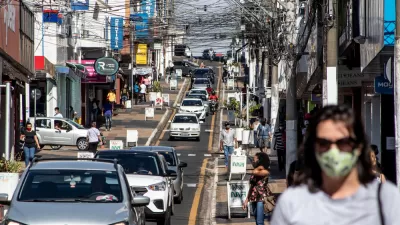Leão Serva reports on the case of São Paulo, where a value capture funding mechanism has raised a huge amount of public revenue to pay for infrastructure projects and public housing.
Here's how the São Paulo value capture program works, according to an article by Leão Serva: "City leaders identify a redevelopment zone, and issue a number of bonds to be sold to developers at auction. The bonds entitle the developers to build bigger buildings than the law would normally allow. Revenue from the bond sales are invested back into housing, roads and other infrastructure in the same redevelopment zone."
Especially in areas with high demand for new construction, developers have not been timid in bidding for these bonds. "And the auctions have yielded the city a massive windfall. In 12 years, São Paulo has raised about R$ 4.5 billion, or close to $2 billion in U.S. dollars, through these sales."
"In São Paulo’s case, the action to unlock land value is 'upzoning' an area for more intense development," but Serva also describes other cities or examples where a value capture program can help close the funding gap for badly needed infrastructure investments.
Serva's coverage is one of the rare examples of clear and accessible writing on what could be wonky subject matter. The article also covers some of the criticisms and recommended reforms for the São Paulo program.
FULL STORY: How São Paulo uses “value capture” to raise billions for infrastructure

Maui's Vacation Rental Debate Turns Ugly
Verbal attacks, misinformation campaigns and fistfights plague a high-stakes debate to convert thousands of vacation rentals into long-term housing.

Planetizen Federal Action Tracker
A weekly monitor of how Trump’s orders and actions are impacting planners and planning in America.

In Urban Planning, AI Prompting Could be the New Design Thinking
Creativity has long been key to great urban design. What if we see AI as our new creative partner?

Portland Raises Parking Fees to Pay for Street Maintenance
The city is struggling to bridge a massive budget gap at the Bureau of Transportation, which largely depleted its reserves during the Civd-19 pandemic.

Spokane Mayor Introduces Housing Reforms Package
Mayor Lisa Brown’s proposals include deferring or waiving some development fees to encourage more affordable housing development.

Houston Mayor Kills Another Bike Lane
The mayor rejected a proposed bike lane in the Montrose district in keeping with his pledge to maintain car lanes.
Urban Design for Planners 1: Software Tools
This six-course series explores essential urban design concepts using open source software and equips planners with the tools they need to participate fully in the urban design process.
Planning for Universal Design
Learn the tools for implementing Universal Design in planning regulations.
Gallatin County Department of Planning & Community Development
Heyer Gruel & Associates PA
JM Goldson LLC
City of Camden Redevelopment Agency
City of Astoria
Transportation Research & Education Center (TREC) at Portland State University
Jefferson Parish Government
Camden Redevelopment Agency
City of Claremont




























